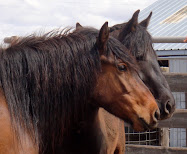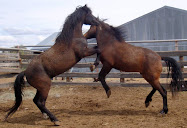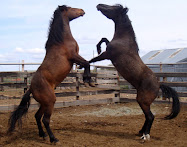The on-line adoption ends tomorrow morning. I am the only bidder on the horse I want. The other bid dropped out. I'm very nervous. The corrals are not finished yet, but will be after this coming weekend, I hope. If I get the horse I have no idea when he will be coming up here. Brad and William keep saying he might not be as nice as Wildairo and he might be crazy as a loon. If Brad says, "You got really lucky with Wildairo" one more time I'm going to flip. He looks nice in the photos. Besides he's one of Wildairo's home boys and Wildairo will keep him in line, right?
Wildairo gave me a huge scare on Saturday. He was making chewing motions and drooling. I went all 'shakey leg'. I asked him what was wrong and he walked up to me and bit the wooden fence board to show me what he'd done. Silly boy had a splinter in his mouth. I ran my fingers inside his lips and gums. I was tempted to put my hand inside his mouth. Anyway he ate his hay and afterwards was OK.
Wildairo has become accustomed to the tractor and backhoe working next to his corral. I think he enjoys the entertainment.
My youngest son, William who's 19 has become very fond of Wildairo and keeps going over to the corrals to talk to him. William has never shown any real interest in horses till now. I bought Foxsun when I was pregnant with him, so he's always had a horse around and thinks Fox is a family member. He's asking lots of questions about horses and scratching and kissing Wildairo. I was afraid of him getting hurt at first because I thought he wouldn't be able to 'read' Wildairo's body language but William seems to have good horse sense because he seems astutely aware of Wildairo's moods. He has also confessed he's been going into Wildairo's corral to play with him when I'm not around. Wildairo does seem to really enjoy William's company.
Brad is oblivious when a horse is threatening him even though he's been around horses all his life. Brad's father had no horse sense either despite using horses for farm work as a youngster. His first job, he told me, was unhitching the team. When my father-in-law was alive and around me and my horses, I was very surprised that he knew diddly squat about horses. No, I take that back; he actually gave some advice one day, he said, "When you hit a horse, don't stand right behind them because that's how I got my wrist broken". Ha ha. He hit a team horse with a 2x4 while standing behind him! He was amazed I could stand behind my horse to brush his tail and not get put into orbit.
Brad's grandfather, BJ Lyons, was a pioneer and homesteaded where we still live when he was only 20 years old. We live in the house he built 100 years ago. BJ was a rancher when there were no fences in this part of the country yet. They would have huge round ups where everyone participated. He would capture his cattle in a place called Parker Horn in Moses Lake which is 50 miles from here!
BJ Lyons was born in 1870 and died in 1967. He wrote a book about his adventures called, 'The Thrills and Spills of a Cowboy Rancher', 1959. I have chosen some parts of his book to copy here as they are of particular interest to wild horse enthusiasts. The following is from the chapter titled 'Migration'.
'When I first came to this region one could plainly hear the clattering of hoofs through the night as large bands of wild horses came galloping down the south-side trails that led to the creek, barely a stones throw from where Odessa now stands, greatly widening the creek channel at that point. These unfamiliar sounds, though not unpleasant, were to me a new phase of life that could be experienced only in the West'.
BJ Lyon's book is so fascinating I'll copy some more from a chapter titled 'Range Riding;
'Cowpunching was rugged work, requiring a tremendous amount of experience and endurance if one hoped to become more than a mere helper. I have known of many instances when a husky young fellows without adequate experience became imbued with the idea that because they were robust and had ridden cayuses that merely "crow hopped" (a mild form of bucking) they could manage the Western bronco. Such performances were amusing to witness but never inspiriting. Among the top-ranking cowboys with whom I was acquainted very few indeed ever acquired more than a mediocre reputation as "bronco buster", regardless of his sturdiness, after reaching the age of maturity. Any man whose work was to conquer an animal that could bite and strike as viciously as any wild beast was, to say the least, engaged in a rather hazardous way of making a living.
Horsemanship has become a lost art in nearly every section of our state, and that noble animal, once the pride of the nation, bids fair to become all but extinct in the West. It is now mainly in the small mountainous area that a few horses are required in connection with the cattle industry, which is still carried on to a limited extent among the foothills of the Cascades.
Many of our native horses which originally ranges over the wild, unsettled regions once owned by Mexico but later ceded to the United States by that country were known as cayuses. These hardy little animals, survivals of an earlier era, are entitled to considerable credit as an active force in the development of the West. No animal was more tenacious of life, nor more inured to the merciless storms that sometimes swept over his range. Richly endowed with a self-reliance which enabled him to care for himself under the most trying conditions, he always emerged in the spring, thin in flesh but undaunted in spirit, while the larger and better bred horses were sometimes unable to survive. Nevertheless, many hateful imputations have been hurled against these heroic little horses, some of which were exemplified in their general behaviour both as work animals on the ranch and as saddle horses.
It must be acknowledged in fairness, however, that the typical cayuse was a natural-born chiseler, dominated by a special type of mentality which achieved the ultimate in deceitfulness. He would play the role of a race horse when one tried to catch him and the slow amble of infirmity when hitched to a load. However, he made a tolerably good pack animal when heavy and gentle enough to be used for that purpose'.
I wish he'd wrote more about the wild horses of this area. A few weeks ago in the local paper in the '100 years ago this week' section, they mentioned the wild horse round up in Moses Lake where they captured 5,000 horses and loaded them on to trains to be shipped back east.
Now here I am bringing the wild horses home.
Showing posts with label parker horn. Show all posts
Showing posts with label parker horn. Show all posts
Tuesday, July 29, 2008
Subscribe to:
Posts (Atom)





